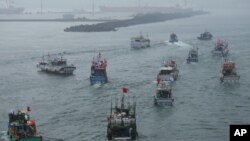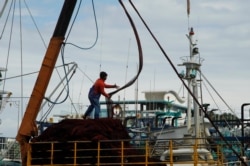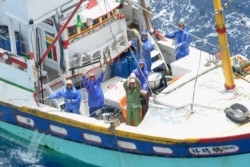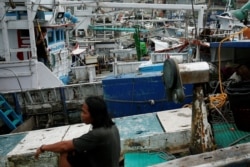Taiwan's fishery regulator this week rebuked last month's U.S. inclusion of Taiwan-caught fish for the first time in its list of goods produced by forced labor, saying the move inflicts "unfair" harm on law-abiding producers, although fisher advocacy groups disagree.
The U.S. Labor Department Sept. 30 added fish from Taiwan to the latest edition of its "List of Goods Produced by Child Labor or Forced Labor," required under 2005 U.S. legislation.
Taiwan has a distant-water fishing fleet of more than 1,100 vessels, the world's second largest after China, with an annual output value of $1.4 billion. Fisheries Agency figures show the island employs about 32,000 migrant fishers, mostly from Indonesia and the Philippines, 20,000 of whom work aboard Taiwan-flagged distant-water vessels.
While pledging to investigate the environmental group's accusations, Taiwan's Fisheries Agency said it hopes to reverse the U.S. decision by presenting evidence showing Taiwan-flagged distant-water vessels comply with the relevant International Labor Organization fishing convention.
Tainted reputation
Lin Ding-rong, director of the agency's deep-sea fisheries division, told VOA on Monday the inclusion has hurt Taiwanese suppliers' reputation and their distant-water catch, although their U.S.-bound exports would not be immediately affected.
"This has negatively impacted U.S. buyers' [confidence] in sourcing catch [from Taiwan]. Frankly, we disagree with the U.S. decision, which was based on offenses by one or a few vessels but will largely hurt the interests of the majority of law-abiding fishermen here," Lin told VOA by phone.
Two industry representatives also complained to VOA that the inclusion has stigmatized the island's entire fishing industry, where they said a few rotten apples spoiled the barrel.
"If up to 98%, 99% of us have progressed significantly, no such stigma should be left to us. I think it is unfair to us and the [Taiwan] government should speak up on behalf of us," Edward Huang, secretary-general of the fishermen's association in the southern port city of Kaohsiung, told VOA by phone.
Taiwan's inclusion in the list could subject U.S. companies sourcing fish from Taiwan to U.S. customs scrutiny.
Lin pointed to a new law that includes provisions to limit work hours, protect wages, and improve living conditions for workers, as well as setting out conditions that would require the dispatch of inspectors to crack down on illegal fishing and forced labor.
Lin also said his agency is working to overcome technical difficulties in installing electronic monitoring systems or wireless networks on ships to allow it to keep tabs on conditions on board.
Inclusion called justified
Seven organizations promoting migrant fisher rights in Taiwan, however, insisted that Taiwan-linked distant-water vessels' mistreatment of laborers – confiscation of documents, excessive overtime, physical and verbal abuse and underpayment – justifies the inclusion.
Chiu Shao-chi, of the Environmental Justice Foundation, welcomed the agency's moves to adopt high-tech steps to initiate more progress but said recent findings of her foundation's interviews with fishers from Indonesia were in line with Greenpeace East Asia's discoveries of illegal fishing and forced labor among the crew on board three vessels flagged or linked to Taiwan, as well as conclusions of the U.S. Labor Department's biennial report.
In its report, the Labor Department cited one worker who said that he received $50 a month after numerous fees were deducted from his monthly salary of $450. Another worker said that he was forced to fish for 16 to 18 hours a day and sometimes up to 34 hours straight if no fish were caught.
Greenpeace East Asia attributed the continuing risk of abuse and forced labor aboard Taiwanese vessels to lack of oversight.
Chiu agreed, saying "as far as fishing vessels are concerned, there lacks a [designated] labor department [in Taiwan] to oversee or implement mandatory labor inspections regularly on ships."
She also endorsed Greenpeace East Asia's conclusions that migrant fishers in Taiwan are still discriminated against by the two-tier recruitment. Under that system, migrant fishers hired overseas usually are disqualified from labor protections, including minimum wages, to which those hired onshore in Taiwan are entitled. She said it's unclear, though, whether it is the recruitment agencies in Taiwan or those in the source country who had exploited the laborers by withholding their wages — a practice barred in Taiwan.
No sweatshop seafood
Chiu, however, urged Taiwanese fishing employers to work with the government to develop a mechanism to provide overtime pay or ensure the island exports no sweatshop seafood.
Greenpeace East Asia, in particular, called on Taiwan-based Fong Chun Fishery Co., one of the world's top three tuna traders, with strong market links to Japan, America and the Europe, to "take more proactive and progressive actions, including enhancing the traceability of the seafood supply chain; source only from vessels that do not take part in transhipments at sea; and strictly uphold with international standards on human and labor rights and best practices."
Transhipment involves transferring catches to refrigerated cargo ships, which facilitates overfishing and has been linked to serious abuses of human and workers' rights at sea since these remote vessels make fewer port calls and thus skirt inspections.
At least two of three Taiwan-linked vessels — whose catches were seized in May and August at U.S. customs on suspicions of forced labor, shark finning or illegal transhipment — were suppliers to Fong Chun Fishery, which in January acquired bankrupt American seafood company Bumble Bee.
In its defense, Fong Chun Fishery told VOA in an emailed reply the company has complied with all laws and regulations both at home and abroad and "all transshipments are made under the supervision of onboard inspectors, [assigned by regional fisheries management organizations]. Fishery regulators of the countries where the vessels are registered are informed before the transshipments are made."
And the company has no longer worked with suppliers once they were found to have been involved in illegal fishing, it said.
Industry insider: More work needed
Taiwan may have made progress in reforming its fishery regulation in recent years, but more needs to be done to improve its record of upholding rights of migrant workers, an industry insider, who previously worked for the island's fishery regulator, told VOA on the condition of anonymity.
He said given the harsh nature of distant-water fishing, local fishers have kept turning away from working onboard, leaving vacancies for migrant workers to fill in. The headache won't go away if the problem of labor exploitation isn't eventually addressed, he said.
To start off, he suggests fishing companies to compensate crew onboard for working overtime or add manpower to work in shifts.
Chen Chun-sheng, secretary-general of Suao Fishermen's Association in northern Taiwan, said that adding manpower onboard isn't feasible given the limited space on the ships and extra cost burden.
However, compensation for overtime is reasonable on the condition that fishing companies have profits to share, he said. Therefore, an employee bonus scheme may be a win-win cure for the island's distant-water fishing industry, he said.







